Dentures – Glenpool, OK
Convenient, Reliable Replacements for All of Your Teeth

Dentures have been restoring smiles for centuries, even dating back to ancient Egyptian times. Luckily for you, dentures today are stronger and more natural-looking than ever. At 918 Dentist of Glenpool, we offer partial, full, and implant dentures to provide you with the option that is best for your smile. Keep reading to learn more about dentures in Glenpool, OK and how Dr. Mohanna and Dr. Georgy can restore the look, feel, and function back to your smile.
Why Choose 918 Dentist of Glenpool for Dentures?
- We Accept Dental Insurance
- Natural-Looking Dental Prosthetics
- Start-to-Finish Implant Denture Procedure
What are Dentures?

Using the latest technology, our dentists will take special images and impressions of your mouth to create your personalized denture mold. Dentures are composed of a gum-colored base, which is attached to your false teeth. The base is designed to rest on top of your gums, or it can also be held in place with clasps. Typically, dentures are made with a plastic resin that allows for maximum flexibility and comfort. Most dentures are also completely removeable, which makes cleaning and oral healthcare simple and convenient.
Who’s a Good Candidate for Dentures?
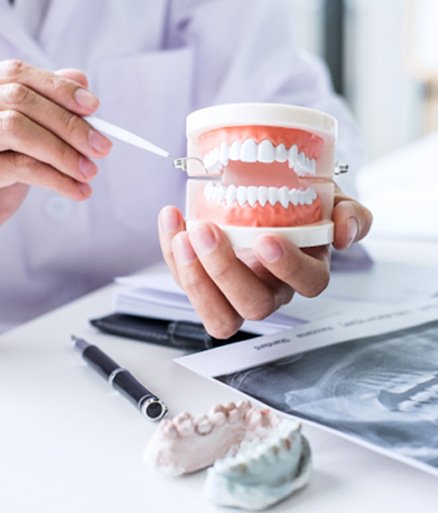
Typically, almost anyone with missing teeth can qualify for dentures. The prosthetics’ requirements, after all, aren’t overly strict. That said, perhaps you’re still unsure of whether dentures are right for you. Well, the only way to settle the matter is by consulting with our dentistsour dentists. They’ll assess you to see if you’re a good dentures candidate in Glenpool. Should you not be, though, that’s okay - our office can perform prep work so you qualify later.
Effects of Missing Teeth
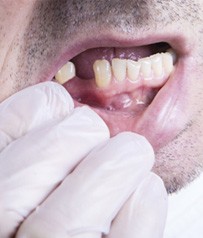
Before getting dentures, you’ll want to review the causes and effects of tooth loss. This practice will help you see how dentures could benefit you.
If you didn’t already know, people can lose teeth for many reasons. A heavily decayed tooth, for instance, might lose support and fall on its own. On the other hand, gum disease may erode the bone and tissue needed to keep your teeth in place. An accident or injury could even knock out a tooth due to sheer force.
Despite the various causes, the effects of missing teeth are pretty consistent. First, it immediately makes eating, speaking, and even smiling difficult. With time, the smile gaps erode your jawbone as well, triggering a facial collapse. The spaces can also shift your remaining teeth, leading to a crooked smile and further tooth loss.
What Qualifies You for Dentures?

Once again, being without teeth should qualify you for dentures. That said, you’d be wise to consider other factors as well.
For instance, assess your oral health before pursuing treatment. If some of your teeth are sensitive or decayed, dentures can safely replace them. You should also confirm that you have healthy gum and jaw tissues; otherwise, your new teeth will lack support. Lastly, you need a solid commitment to dental care for dentures to work long-term.
Furthermore, how many teeth you lack will impact future care. You’ll need one of two possible dentures based on whether the number is low or high. A partial kind is ideal for replacing a few teeth. Meanwhile, a full denture is best when all pearly whites along an arch are gone.
Finances influence candidacy as well. Being cheaper than other restorations, dentures are great for patients on a budget.
Alternative Tooth-Replacement Options
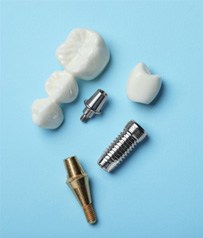
If you aren’t a good dentures candidate, don’t worry. The 918 Dentist’s office has other restorative options. In particular, our team offers two additional procedures. They are:
- Dental Bridge - Dental bridges are fixed restorations, often made of crowns fused to a pontic. Rather than fitting into your jaw’s empty sockets, they rely on your surrounding teeth to secure themselves.
- Dental Implants - Dental implants are prosthetic teeth placed in your jaw. Due to using titanium as a base, they slowly fuse with your jawbone over time. This trait means they won’t slip, fall, or remove enamel, making them expensive.
Learn More About Dental Bridges Learn More About Dental Implants
How Dentures Are Made

Knowing how dentures are made in Glenpool will help you to have a greater appreciation for your new teeth. The attention to detail and skilled craftsmanship that goes into creating every piece requires optimal artistry and patience. To better understand what goes into fabricating your new pearly whites, take a few moments to review the following information and let us know if you have any questions.
What Are Dentures Made Of?

The base and artificial teeth are the two components that make up a denture. Each serves a unique purpose and is designed to work together to ensure optimal aesthetics and ease of use. The moment you are fitted with your new teeth, you should experience greater comfort and confidence in the way you look and how your teeth feel.
The base of a denture is usually made out of acrylic but can come crafted from resin, porcelain, metal, or nylon. They are crafted to mimic the natural gum tissue color so that it is not obvious to others that your teeth are not natural.
Speaking of your teeth, they are commonly made out of porcelain or resin materials that look natural, are easy to use, and blend in with any existing teeth you might have.
While a partial denture looks vastly different than a full denture, you will find that they are both made from the same materials. However, partials rely on metal clips or clasps to stay in place, and full dentures use natural suction and denture adhesives.
The Denture Creation Process

There are many unique steps that a lab technician must complete before handing over the finalized denture to our team. While the process begins with us at 918 Dentist, taking measurements and impressions of your smile, we pass this information onto a dental laboratory. Once in their hands, technicians begin to work on fabricating your new smile.
From using the measurements and mold to craft their own wax version, you’ll return to our office to determine the fit of the wax dentures, which will then be returned to the lab. While waiting for your finalized denture to be completed, you’ll wear temporary ones to help you eat and speak during this time.
Using plaster molds, boiling water, and uniquely designed dental instruments to sculpt, mold, and define your new dentures, the base will be matched to your natural gum color before the artificial teeth are placed onto the base. Once polished, our team will obtain the final product, which you will receive when you arrive for your final visit.
Adjusting to Your New Dentures

There is an adjustment phase you can expect when wearing new dentures. Whether you’re receiving them for the first time or preparing for a replacement set, it will take time to get used to your new smile. This includes learning how to speak clearly, which will require that you practice reading aloud and/or speaking slower to fully enunciate difficult words or phrases.
You’ll also need to start eating softer foods so that you can learn to eat properly while wearing your dentures. In time, you’ll find that you can incorporate solid foods with confidence.
The Benefits of Dentures
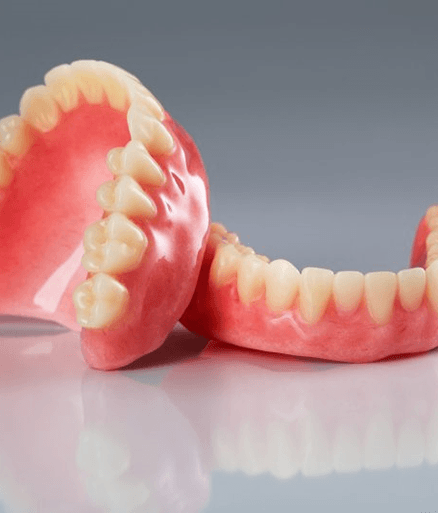
Losing some or all of your pearly whites can make it challenging to do daily tasks, such as speaking clearly, eating comfortably, or smiling confidently. However, with dentures, you can get the life-changing and natural-looking prosthetics you need to restore your smile and bite. You’ll also be able to appreciate various other advantages of this treatment that can impact your oral and overall well-being! Here are some of the benefits of dentures.
Psychological Benefits

There are multiple psychological downsides to losing some or all of your teeth, as you may experience several obvious gaps in your smile. This can easily cause you to want to hide your mouth when laughing or talking, or you might avoid engaging in social events altogether. With dentures, you can reliably restore your grin, allowing you to feel more confident without worrying much about your speech, chewing ability, and appearance.
Clearer Enunciation

Speaking can become much more challenging without all of your pearly whites. This is because we typically need to position our lips and tongue against our teeth to pronounce certain sounds or words. Without all of them, we can end up having difficulties in conversation or communicating effectively. By restoring your smile with dentures, you’ll be more likely to enunciate your words. It will take some time to get used to them, but with a little practice, you can start to feel more natural in your speech.
Improves Nutrition

Certain foods are tougher in texture, including fruits, veggies, and lean meats. Being unable to effectively chew and grind your meals can lead to complications like malnutrition and indigestion. Fortunately, dentures can help you regain the majority of your bite, allowing you to expand your diet and chew more comfortably. By eating more nutritious foods, you’ll also be able to promote better oral and overall health in the long run.
Preserves Oral Health

Did you know any remaining natural teeth can start to shift out of place whenever you lose a tooth? This is due to the jawbone weakening from a lack of stimulation, causing the other pearly whites to move to fill the space. By wearing dentures, you can prevent your other teeth from shifting, which can also minimize your risk of further tooth loss. Your prosthetics will also help share the pressure of chewing so that your remaining teeth don’t wear down as fast.
Expands Opportunities

Since your smile is one of the first things people notice about you, it’s important to be able to show off a nice and healthy grin during initial interactions. Whether it’s for a job interview, promotion, or first date, dentures can help you regain your lost teeth and boost your confidence. Others will also see how you carry yourself and may perceive you as more outgoing, competent, and attractive—all of which can expand your opportunities in your social and professional life!
Your Options for Dentures

We offer several options to our patients because no two smiles are exactly the same. Our dentists will carefully examine your mouth to recommend the dentures that you would benefit from most.
Partial Dentures

Patients who are missing multiple teeth across the arch are great candidates for partial dentures. This restoration allows you to keep your remaining natural teeth, while filling the gaps in your smile. Partial dentures are typically built around your natural tooth structure and held in place with clasps.
Full Dentures

Full dentures are still the quickest and most effective way to replace a whole arch of teeth. They rest on top of your gums and stay in place using natural suction. You can also use denture adhesive for extra security, but they should still be removed each night for cleaning.
Dental Implant-Retained Dentures

If you’re looking for the most functional and natural feeling replacement, implant-retained dentures may be the right choice for you. Dental implants, tiny titanium posts placed in your jaw that act as artificial tooth roots, can be strategically placed in your mouth to support dentures. This allows for maximum biting power, and it also preserves and strengthens your jawbone.
Understanding the Cost of Dentures
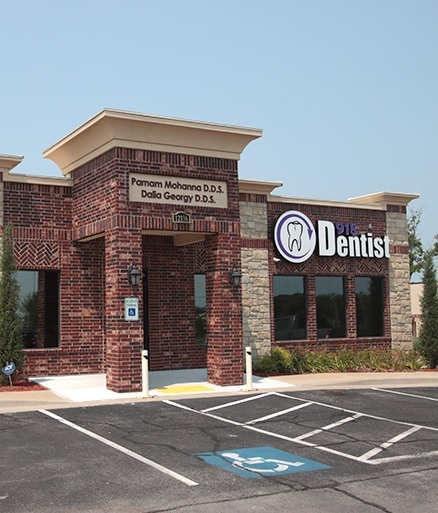
The cost of dentures in Glenpool can vary based on the condition of your oral health, what type of dentures you need, and numerous other variables. That is why we can’t give an estimate without examining your smile first. At 918 Dentist of Glenpool, we take pride in providing quality and affordable dentistry. We are happy to provide options for helping dentures fit into your budget. We also gladly accept insurance.
Factors That Affect the Cost of Dentures

Because each denture is tailored to each patient’s unique needs, there is no one-size-fits-all cost. Some of the factors that can influence the cost of your dentures might include:
- Any procedures you need prior to getting dentures (gum disease therapy, tooth extractions, etc.)
- How many teeth you’re missing
- The materials your denture is made from (usually acrylic or porcelain)
One thing to note is that inexpensive dentures are not necessarily better. Cheaply made dentures tend to break down easily and require frequent replacements. For something that you’re going to use every single day when talking, eating, and smiling, it’s worth it to invest in a quality solution.
Are Implant Dentures More Expensive?
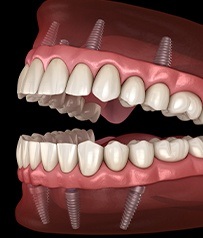
Initially, yes. Implant dentures require the surgical placement of multiple dental implants, making them more expensive at first than traditional dentures in Glenpool. However, implant dentures pay for themselves in the long run. They’re designed to last for decades compared to the five to seven years that conventional dentures last. Additionally, they stimulate the jaw to prevent the bone deterioration that occurs after tooth loss. They’re also more reliable because they’re fixed in your jawbone. In short, implant dentures are an investment worth making!
Does Dental Insurance Cover Dentures?

The majority of dental insurance plans do cover dentures to some extent. On average, you can expect insurance to cover about 50% of the cost, but this will vary from plan to plan. At 918 Dentist of Glenpool, we are in-network with many of the nation’s leading dental insurance plans, making it incredibly easy to save on your care. Even if your plan is out-of-network, a member of our knowledgeable team can still look over your plan and help you find some savings!
Other Options for Making Dentures Affordable
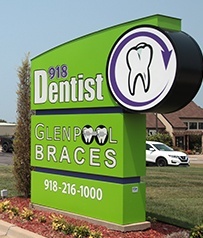
Besides insurance, your denture dentist in Glenpool has other ways of making your new smile affordable. For one, we can help you apply for a low-to-no interest loan through CareCredit. Our in-house loyalty plan is another option to save on more than just dentures; for a flat yearly fee, you get access to all of the preventive care that insurance covers, plus additional discounts on most of our services, including dentures.
Dentures Aftercare

Your dentures can completely transform the appearance and function of your smile! However, even if you don’t have any teeth left, you should still see the dentist every six months for regular checkups. There are several different reasons for this. Your dentist will continue to monitor any existing teeth and gum tissue. They will also keep an eye out for any abnormalities that could indicate oral cancer. When you have dentures, it can be very difficult to notice these issues on your own. Early detection from your dentist is key to making a full recovery.
Removeable Dentures
Remove After Eating
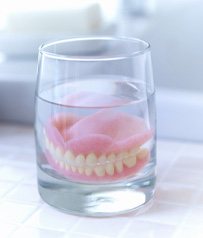
After eating, you should always remove and rinse your dentures, this will help to prevent buildups of food debris and plaque. When you rinse your dentures, don’t use hot water. This can warp the denture material and cause them not to fit.
Clean Your Restoration
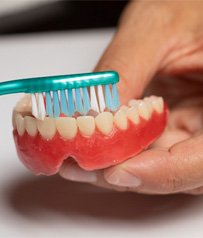
To clean your dentures, remove them first. Using a soft-bristled toothbrush and a small amount of unscented hand soap, mild dish soap, or denture cleanser to gently brush your dentures. You shouldn’t use regular toothpaste because dentures aren’t made to stand up to abrasive products. If you aren’t going to put your dentures back in your mouth right away, place them in a container of water or denture-cleansing solution so they don’t dry out and lose their shape. Always rinse your dentures thoroughly before putting them back in your mouth. These cleaning materials can be harmful if consumed.
Keep Your Dentures Safe
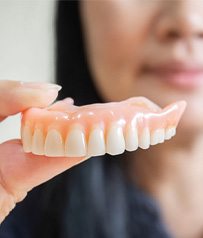
When cleaning your dentures, you may want to place a towel underneath just in case you accidentally drop them. This will reduce the probability of your dentures becoming damaged. Keep your dentures in a place that is out of reach from small children and pets.
Remove When You Sleep

Take your dentures out at night when you go to bed. Wearing dentures restricts the circulation in your gums, leading to soft-tissue irritation. Sleeping with dentures has been associated with a higher risk of pneumonia and higher levels of gum and tongue plaque. By keeping your dentures in a denture-soaking solution overnight, you can prevent your dentures from drying out and permanently losing their shape.
Notice Changes

Keep an eye out for changes so you can address them with your dentist. This includes mouth sores, gum irritation, or signs of infection. If your dentures become damaged, don’t try to repair them on your own. You could end up accidentally damaging them further. Instead, give us a call. If your dentures are shifting, clicking, or showing any other signs of not fitting properly, don’t hesitate to reach out. We’d be happy to help ensure your smile is as comfortable as possible.
All-on-4 Dentures

If you have All-on-4 dental implants, the aftercare process looks a little bit different. Brush your dentures twice a day using a soft-bristled manual or electric toothbrush and non-abrasive toothpaste. Avoid toothpaste containing baking soda or stain-removing agents. You should floss your replacement teeth once a day. Investing in a water flosser is a great way to keep both your restoration and your implants clean. Another great way to keep your smile fresh is to use an antibacterial mouthwash daily to prevent the growth of tartar.
Dentures Frequently Asked Questions
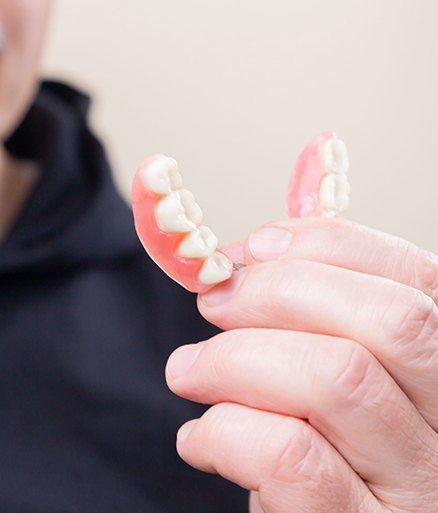
Are you considering getting dentures to replace your missing teeth and restore your smile back to its former glory? These prosthetic teeth allow you to eat your favorite foods and smile with as much confidence as you had when you had all of your natural teeth. However, you probably have a few questions about some of the details of the treatment process. Don’t worry; we’ve taken some denture FAQs and answered them below for your benefit. If you have a denture question that you don’t see answered on this page, just give us a call and ask!
How often will I have to replace my dentures?
Unfortunately, even the most well-made dentures are not built to last forever. Typically, your dentures will need to be replaced every 5-7 years. This is because when you’re missing teeth, your jawbone gradually deteriorates due to no longer receiving stimulation from the roots of your teeth. As a result, your face and jaw change shape, meaning the dentures lose their fit every few years and you have to get them replaced in order to ensure a snug and proper fit.
Can I sleep with my dentures in?
While it’s perfectly possible to sleep with your dentures in, it’s not recommended, the reason being that your dentures should be allowed to soak every night. This lets them stay moist and prevents them from drying out, which can warp their shape and cause them to not fit correctly. Sleeping without your dentures also gives your gums and jawbone a chance to rest from the pressure of holding your dentures in place all day. Lastly, soaking your dentures overnight allows them to become clean, removing plaque and bits of food that may have accumulated on them during the day. It’s never advisable to wear your dentures for a full 24 hours without cleaning them, so overnight is the perfect opportunity to let them soak.
How often will I need to see the dentist?
The idea that you don’t need to see your dentist anymore after you have dentures is only a myth. You’ll still need to come and see us for a checkup at least once every six months to make sure any of your remaining teeth and gums are still in good condition. At these appointments, we can also screen for problems like gum disease and oral cancer, which often don’t present symptoms until irreversible damage has already been done. These visits will also ensure that your dentures still fit comfortably within your mouth.
How long will it take me to adjust to wearing my dentures?
The answer to this question is slightly different for everyone, but it will probably take a few weeks. After all, there is a foreign object in your mouth, and your tongue, cheeks, lips, and gums will take a while to grow accustomed to it. You can speed this adjustment process along by practicing speaking in front of a mirror. It may also help to cut your food into bite-sized chunks and/or stick to a soft food diet until you feel more comfortable chewing with your new teeth and can switch to crunchier, heartier foods.
I Need a Checkup & Cleaning I Have a Cavity or Broken Tooth I Need a Dentist for My Child I Want a Straighter Smile I am Unhappy with My Smile I am in Pain & Need Help I am Concerned About Bleeding Gums I am Missing One or More Teeth I am Scared of the Dentist I am Concerned about Sleep Apnea View Our Services
